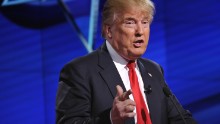"If
that unity ticket is unable to get 1,237 delegates prior to the
convention, we recognize that it took Abraham Lincoln three ballots at
the Republican convention in 1860 to become the party's nominee and if
it is good enough for Lincoln, that process should be good enough for
all the candidates without threats of riots," Erickson wrote in a
statement after conservatives gathered in Washington to discuss ways to
thwart Trump's march to the nomination.
The
long and contentious meeting at the Army Navy Club included discussion
about a unity ticket involving Texas Sen. Ted Cruz and Ohio Gov. John
Kasich, according to a source familiar with the conversation. But the
group decided not to commit to that pairing "because of the egos
involved," according to the source.
Around
the time the meeting broke up, Florida Sen. Marco Rubio made his first
public statements on Capitol Hill after dropping his presidential bid on
Tuesday.
"Hopefully there's time to
still prevent a Trump nomination, which I think would fracture the party
and be damaging to the conservative movement," Rubio said.
Trump
dominated primary contests on Tuesday and has the lead in the delegate
count. But his loss in Ohio raises the prospect that he won't secure
enough delegates to win the nomination outright before the party's July
convention in Cleveland.
Trump's rise has long worried many in the party. But recent incidents of violence and Trump's comment to
CNN's "New Day" on Wednesday that riots might erupt in the event of a contested convention have escalated those concerns.
Erickson said his group is "committed to ensuring a real conservative candidate is elected."
"We believe that neither Hillary Clinton nor Donald Trump, a Hillary Clinton donor, is that person," he wrote.
The group left the door open to potentially supporting a third party race if Republicans are unable to stop Trump.
"We
intend to keep our options open as to other avenues to oppose Donald
Trump," the statement said. "Our multiple decades of work in the
conservative movement for free markets, limited government, national
defense, religious liberty, life, and marriage are about ideas, not
necessarily parties."
Rep.
Trent Franks, a member of the House Freedom Caucus, attended the
meeting briefly. So did conservative leader Bill Wichterman.
There
was discussion that if Trump became GOP nominee, then "the GOP ceases
to be a party for traditional conservatives, who must go elsewhere,"
according to the source familiar with the discussion. The thought
process at this session was to work with "an existing third party
instead of trying for ballot access."
That would probably be the existing Libertarian or Constitution parties.
Not all the attendees appeared to be giving up on Trump's existing challengers.
"I'm there to support Ted Cruz," said Mike Farris, a Republican lawyer. "There's a lot of Cruz support."
Another participant, Deborah DeMoss Fonseca, likened the Trump phenomenon to a "1,000 year flood."
"It
happens once every 1,000 years and you don't know how to handle it,"
she said. "So I think people have been experimenting with different
things to see what would work."




































No comments:
Post a Comment